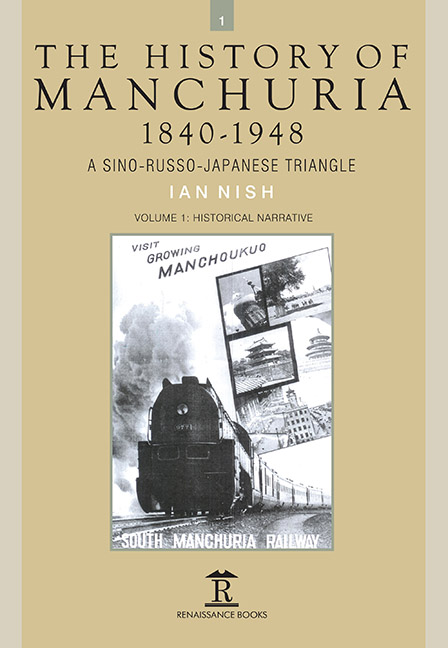Book contents
- Frontmatter
- Dedication
- Contents
- Preface
- Acknowledgements
- Name Conventions
- List of Abbreviations
- List of Maps
- Chapter One Manchuria and Russian Ambition, 1840s–1890s
- Chapter Two Sino-Japanese War and After, 1894–1900
- Chapter Three Prelude to the Russo-Japanese War, 1900–1905
- Chapter Four Railways, Reforms and Revolutions, 1906–1914
- Chapter Five Wartime Turmoil in Manchuria, 1915–1922
- Chapter Six Chang Tso-Lin’s Manchuria, 1922–28
- Chapter Seven Chinese Nationalism and Foreign Railways, 1929–1931
- Chapter Eight Lytton Commission in Manchuria, 1931–1932
- Chapter Nine Manchukuo: From Republic to Empire, 1933–1937
- Chapter Ten A Decade of Wars, 1938–1948
- Epilogue
- Map
- Select Bibliography
- Index
- Volume 2: Select Primary Sources
- Miscellaneous Frontmatter
- Dedication
- Miscellaneous Frontmatter
- Chapter 1 1840–1894
- Chapter 2 1895–1899
- Chapter 3 1900–1905
- Chapter 4 1905–1914
- Chapter 5 1915–1922
- Chapter 6 1922–1928
- Chapter 7 1929–1931
- Chapter 8 1931–1932
- Chapter 9 1933–1937
- Chapter 10 1938–1948
- Apendix Appeal by the Chinese Government
Chapter Four - Railways, Reforms and Revolutions, 1906–1914
Published online by Cambridge University Press: 18 November 2023
- Frontmatter
- Dedication
- Contents
- Preface
- Acknowledgements
- Name Conventions
- List of Abbreviations
- List of Maps
- Chapter One Manchuria and Russian Ambition, 1840s–1890s
- Chapter Two Sino-Japanese War and After, 1894–1900
- Chapter Three Prelude to the Russo-Japanese War, 1900–1905
- Chapter Four Railways, Reforms and Revolutions, 1906–1914
- Chapter Five Wartime Turmoil in Manchuria, 1915–1922
- Chapter Six Chang Tso-Lin’s Manchuria, 1922–28
- Chapter Seven Chinese Nationalism and Foreign Railways, 1929–1931
- Chapter Eight Lytton Commission in Manchuria, 1931–1932
- Chapter Nine Manchukuo: From Republic to Empire, 1933–1937
- Chapter Ten A Decade of Wars, 1938–1948
- Epilogue
- Map
- Select Bibliography
- Index
- Volume 2: Select Primary Sources
- Miscellaneous Frontmatter
- Dedication
- Miscellaneous Frontmatter
- Chapter 1 1840–1894
- Chapter 2 1895–1899
- Chapter 3 1900–1905
- Chapter 4 1905–1914
- Chapter 5 1915–1922
- Chapter 6 1922–1928
- Chapter 7 1929–1931
- Chapter 8 1931–1932
- Chapter 9 1933–1937
- Chapter 10 1938–1948
- Apendix Appeal by the Chinese Government
Summary
THE PEOPLE OF Manchuria suffered the presence of the occupation armies of Russia and Japan for two years after the war. At the end of 1906, the military authorities of both countries were still a power in the land. Under the Portsmouth treaty of 1905, there had been an agreement for the evacuation of troops; but it was slow to take effect. In Japan there had been nationalist riots in Tokyo, complaining that she had not gained enough from the treaty and opposing the peace settlement (kowa hantai kokumin taikai). Russia feared that there was a distinct possibility that the war would be re-started by Japan in order to satisfy public opinion and decided not to evacuate. Similarly, Japan was convinced that Russia had no intention of pulling out and wanted to fight a war of revenge on the soil of Manchuria. In spite of financial constraints, she was reluctant to withdraw forces until Russia was seen to be withdrawing hers. So both sides stayed around until the spring of 1907. The fact that Russian armies beyond the authorized quotas were largely withdrawn before the time fixed was closely watched by Britain whose envoy reported that it made a ‘favourable impression in China’.
In these withdrawals Russia faced a dilemma which did not affect Japan. While Japanese troops were overjoyed that they had defeated a major European army, the Russians were demoralized by defeat. In addition, there was widespread political dissent among soldiers awaiting repatriation and the Russian community in Manchuria. It was, of course, influenced by revolutionary movements in Russia herself. But locally food had from mid-1905 become increasingly scarce because of failures of civil administration. This led to strikes among railway engineers and associated postal and telegraph workers. The telegraph which had been a great asset during the war now became an asset for opponents of the government. Demonstrations by Cossacks and reservists who wanted demobilization and quick repatriation were more serious. There were not enough trains available and they wanted the process for selecting returnees to be fairer.
- Type
- Chapter
- Information
- The History of Manchuria, 1840-1948A Sino-Russo-Japanese Triangle, pp. 57 - 79Publisher: Amsterdam University PressPrint publication year: 2016



